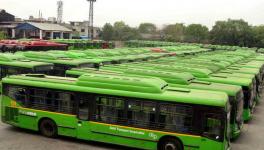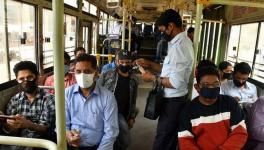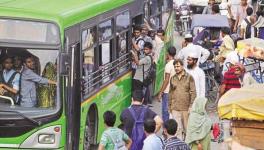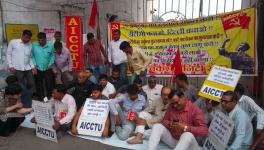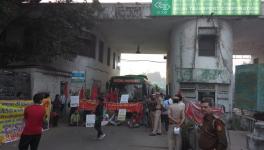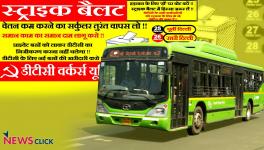Free Rides for Women But No Travelling Allowances for DTC Workers
Image for representational use only.Image Courtesy : The Indian Express
Here are some disturbing but little known facts about the Delhi Transport Corporation (DTC) workers. Around 50% of them are on contract basis. Their wages are not regular but on per kilometre basis which translates to much lower payments for the same job. They do not have any social benefits with recurrent cases of brutal violence used against them by the authority. And most importantly, the case is no different for women workers.
Under the banner of DTC Workers Unity Centre (DWUC), the workers have decided to make the Arvind Kejriwal government listen to their demand by staging a protest on August 29 in front of the DTC headquarters. Their grievances include absence of travelling allowances for all workers and non-payment of uniform allowances to the contractual workers.
Interestingly, the decision to protest demanding basic allowances by the DTC workers has come at a time when Arvind Kejriwal’s government has cleared a supplementary grant of ₹ 140 crore for implementing the free rides scheme for women in public buses and another ₹ 150 crore for implementing the scheme in Delhi Metros.
Speaking to NewsClick, the members of the All India Central Council of Trade Unions (AICCTU)- affiliated union have criticised the Delhi government for displaying double standard over questions related to women and public transport’s safety.
“None of us is against the proposal of providing free public transport to women. We welcome such measures and do understand the benefits of it,” said Prem Pal, Working President of DWUC, “however, our objections arise when this government doesn’t pay attention to the well being of the workers who run those buses,” – a consistent complaint of all the DTC workers that NewsClick spoke to.
Also read: Low Wages and Exploitation: DTC Workers Call ‘Strike Ballot’
According to the workers, DTC employs well over 30,000 workers which include drivers, ticket collectors and office management staff among other posts. Out of these, around 50% are on contractual agreements meaning that they don’t enjoy equal wages and benefits as that of a permanent worker.
“Even Chief Minister Kejriwal has forgotten about the promises he made before the elections which included equal pay for contractual workers and regularisation of their jobs,” added Pal.
These workers work in three shifts, with the first shift starting as early as 4’o clock in the morning. Earlier, the workers used to enjoy services of staff buses, making travelling for these workers – who themselves make transportation of lakhs of Delhities possible – much easier and pocket friendly. However, this service was terminated during the former CM late Sheila Dixit’s tenure.
“What we are demanding from the Kejriwal government is to either provide us with travelling allowance or re-start the staff bus services making travelling safe and economical for us too, which also include the women staff,” Rajesh, General Secretary of DWUC, told NewsClick.
In addition to this, the union is also demanding a provision for allowances for uniforms for the contractual workers who often pay hefty fines when caught without one. According to the union, it is the responsibility of the government to provide uniforms even to the contractual workers.
“It is also very surprising to us,” said Rajesh, “that the government which is so concerned about the safety of women in public buses has turned a blind eye to the prevalent wage system which is one of the main reasons behind bus accidents.”
The contractual workers are deprived of a regular monthly payment system. Rather, their wages are based on the kilometres that they cover in a single day, that is, if they achieve their shift targets. According to Rajesh, the rate is around ₹ 6 per km. Such a wage system often puts the contractual worker in a position where their main objective becomes covering maximum distance resulting into cases of rash driving and violations of traffic regulations, often risking the passengers too.
What’s more, a contractual worker also has to go through the constant pressure of obtaining the day’s job. Thanks to the non-increment in the fleet size of the buses – a long pending demand of the union – most of the contractual workers are often forced to return empty handed since there labour cannot be utilised by the existing fleet.
Also read: Historic DTC Strike Creates Chakka Jam Across Delhi
NewsClick has earlier reported on the non-achievement of the fleet size targets set out by the Kejriwal government. According to the Outcome Budget 2018-19, released in June 2019, the target set by the Delhi government was to increase the DTC buses to 4,176 by 2018-19 from 3,974 plying on the road in 2017-18. However, as opposed to the target, the number in fact decreased to 3,897.
When asked whether the recent announcement of procuring 1,000 buses has brought any hope to the workers, the answer received from the union members was in negative. This is because the buses recently procured were only under the cluster scheme under which the operation of buses goes to Delhi Integrated Multi Modal System (DIMTS) – a joint venture company between the Government of National Capital Territory of Delhi (GNCTD) and the IDFC Foundation (a not-for-profit organization) and as far as the DTC buses are concerned the process is still underway.
While the Arvind Kejriwal government has succeeded in securing attention within mainstream media’s primetime slots with its ambitious proposal of free public transport for women ahead of the 2020 Delhi Assembly election, the discourse has sadly been reduced to the discussion on whether it is a financial boon or bane. And the concerns of the DTC workers find no space in it.
Also read: DTC Workers Hold Namak-Mirch-Roti Dharna Ahead of Oct 29 Strike
Get the latest reports & analysis with people's perspective on Protests, movements & deep analytical videos, discussions of the current affairs in your Telegram app. Subscribe to NewsClick's Telegram channel & get Real-Time updates on stories, as they get published on our website.










